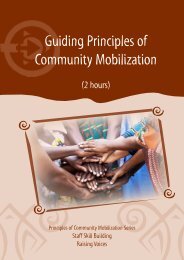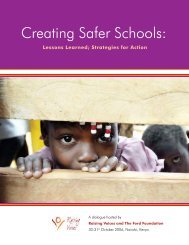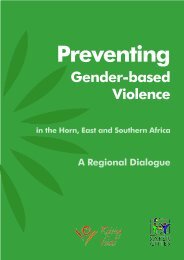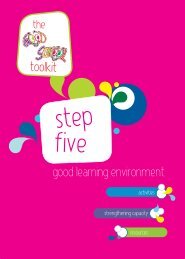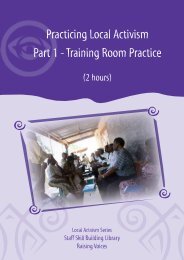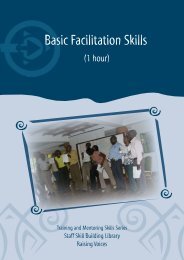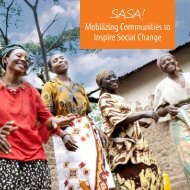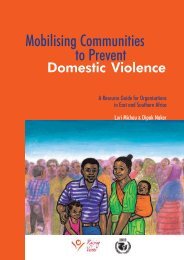CA C 1 - Raising Voices
CA C 1 - Raising Voices
CA C 1 - Raising Voices
You also want an ePaper? Increase the reach of your titles
YUMPU automatically turns print PDFs into web optimized ePapers that Google loves.
<strong>CA</strong>C 2<br />
304<br />
Activity 2.8 Concept of Human Rights (30 min)<br />
Objective<br />
■ Discuss the concept of human rights.<br />
<strong>CA</strong>C 2<br />
Steps<br />
1. Start by introducing the word ‘rights’. We all use it in our everyday language. We say things like, “She<br />
had a right to do that,” or “We have a right to say what we think.”<br />
2. Ask the participants to suggest examples of the use of the word ‘rights’ from their own experiences.<br />
When was the first time they remember hearing it? What was the context in which it was heard?<br />
Encourage people to contribute short experiences of the usage of the word ‘rights’.<br />
3. When you feel that the group has a common understanding of what is meant by the word ‘rights’,<br />
open a discussion by asking the participants:<br />
■ From where do we get our rights?<br />
■ Who gave them to us?<br />
■ Can they be taken away?<br />
4. Encourage a wide range of viewpoints and ask open-ended questions that expand the discussion.<br />
You may have to adopt the role of asking contrary questions. For example:<br />
■ If people say, “God gives us rights,” you could ask, “What about people who don’t believe in<br />
God, or believe in a different God?”<br />
■ If people say, “The government gives us rights,” ask, “Can the government decide which rights<br />
we have and which we don’t? Can people disagree with the government? If the government<br />
didn’t exist, would we still have rights?”<br />
5. The aim of this discussion is not to come up with a correct answer but to get people thinking about<br />
the concept of human rights. It is an example of a reflective discussion where people slowly come to<br />
see the assumptions behind their beliefs. Some key points you may want to introduce in the<br />
discussion include:<br />
■ Usually when we talk of human rights we are talking of natural rights. We are all born with natural<br />
rights and they cannot be taken away by anyone. A government may make a law that formalizes<br />
our natural rights or protects additional rights (e.g., right to own property, right to appeal a<br />
decision deemed unfair in a court of law, a right to a trial before conviction, etc.).<br />
■ Human rights are ‘entitlements’ that every human being has just because they are human. All<br />
human beings have rights – we are born with them and they cannot be taken away.<br />
■ The rights we claim are deeply linked to our view and understanding of justice.<br />
■ A government can affirm and help protect our rights by creating laws, but governments do not<br />
give us our human rights.<br />
■ Every right comes with responsibilities. This means that since I have a right to live free of<br />
violence, I have a responsibility to respect others’ right to safety by being non-violent.<br />
■ When a person violates another person’s rights, they give up some of their own rights. For<br />
example,if a person kills another person, he gives up his right to freedom and may be imprisoned.<br />
■ Every culture and people has a concept of human rights even if they do not use the word ‘right’.<br />
Mobilising Communities to Prevent Domestic Violence




